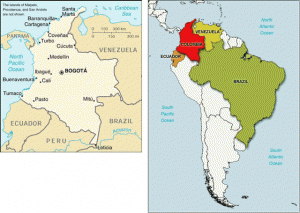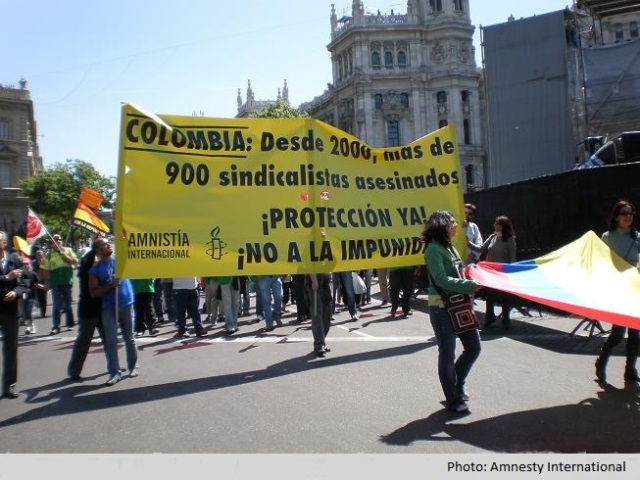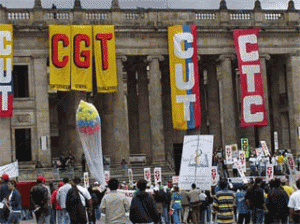VOD editor: the following is an excerpt from an article, which can be read in its entirety by clicking on The Wikileaks Revelations on the role of the AFL-CIO in Latin America. VOD is publishing this to expose not only the role of the AFL-CIO in Colombia (similar to that in many other Latin American countries), but to question the leadership of the union movement in the U.S.
While unions in countries like Greece and Italy are conducting general strikes against the horrific austerity policies there (see article below) unions in the U.S. have yet to call on the economic clout held by their members to fight similar attacks. This article makes one wonder what type of meetings are going on between top union leaders in the U.S. and the forces which are carrying out austerity measures here.
By Alberto C. Ruiz
There are about a dozen Wikileaks cables which reflect meetings between the AFL-CIO’s Solidarity Center and the U.S. Embassy in Bogota, and they are quite revealing. For example, there is an embassy cable from August 11, 2008, entitled, “COLOMBIAN UNIONS, IDEOLOGY, AND THE ARMED CONFLICT.”
And, in this cable, the Solidarity Center’s Rhett Doumitt [the same AFL-CIO staffer directly involved in aiding and abetting forces that carried out the coup against President Chavez in 2002] professes strong views on this subject to the U.S. Embassy, in particular to Ambassador Brownfield.

Rhett Doumitt (right), Solidarity Center Andes Director; Bill Camp (center), Sacramento CLC California; Nancy Hall (left), CWA Dallas Texas
Thus, in this cable, Mr. Doumitt is said to have “complained of a ‘Stalinist’ approach taken by Communist and other hard-left labor leaders within the CUT,” the largest labor confederation in Colombia. The cable continues:
In 2006, they affiliated with the Social Democratic international confederation, which later became the International Trade Union Confederation (ITUC). Even then, RHETT DOUMITT of the AFL-CIO affiliated Solidarity Center said the Communists literally ‘turned the lights out’ at the convention in a last ditch attempt to block this affiliation.
Further in the cable, DOUMITT complains that the politics of the labor movement in Colombia impede positive, practical advances on labor issues. In the April 22 monthly ‘labor dialogue’ meeting with President Uribe, the confederations focused discussions on the investigations of the Colombian congressmen associated with the parapolitical scandal. CGT (Confederacion General de Trabajadores Democraticos) International Relations Secretary Jose Leon Ramirez notes there was no discussion of labor issues at the meeting. Still, DOUMITT says the unions have made progress in moving away from their traditional polemic cold war perspectives.

Colombia is strategically located. bordering on Venezuela and Brazil, which have elected socialist and progressive presidents
Another cable from another meeting indicates identical complaints to the Embassy by Doumitt about the Colombian labor movement elevating its political concerns – e.g., about the “parapolitical” scandal which involved scores of politicians collaborating with the paramilitaries who, among other things, have been hunting down labor leaders – over purely labor concerns.
In this cable, dated February 5, 2009, Doumitt complained that “the public’s perception that the unions value politics over pocket book issues for workers also limit union membership. Doumitt complained that the politics of the labor movement in Colombia impede positive, practical advances on labor issues, but noted that some unions are moving away from their traditional socialist ideologies.”
Still, in another cable dated September 5, 2008, Doumitt seems to side with the Colombian government in terms of the debate over the figures of unionists killed in Colombia. Thus, the cable states:
The tenor of these cables is repeated in other Latin American countries, such as Ecuador, where the Embassy reported on a meeting with Solidarity Center officials who told the Embassy “that unions generally have a bad reputation all around. Younger workers see them as either communist or irrelevant, and most Ecuadorians seen them as essentially selfish actors.”
In a January 22, 2007 cable emanating from Peru, and entitled, “GOP Wins Battle Against Radical Teacher’s Union,” the local AFL-CIO representative is cited as siding with the government in this legal victory which, among other things, limited the number of teachers (from 314 to 30) who could engage in full-time union activity and still receive their teachers’ salaries.
Thus, the cable states: “According to Oscar Muro of the local chapter of the AFL-CIO, the fund sometimes aids teachers in need but is often misused. He further said that 30 subsidized representatives was a generous number given that no other union in the country has such a high number of positions as a percentage of membership.”
Finally, in a cable out of Managua, dated January 23, 2007, and involving meetings with various anti-Sandinista NGO’s, the cable explains that unions can play a role in challenging the policies of President Daniel Ortega, and that “he Ambassador offered to meet with independent unions and suggested that Huembes [a union leader from a non-FSLN union] contact the AFL-CIOregional representative in Guatemala to seek his guidance.”
What these cables portray is an organization, the AFL-CIO, which is beholden to the U.S. State Department and which is reporting to it on a regular basis. Among other things, it is reporting on the perceived blemishes of the union movements in those countries in which it operates.
And, as during the Cold War, the “blemishes” it is reporting on in many instances revolve around the left-wing, and possibly socialist or communist, nature of these unions. Of course, the AFL-CIO is reporting on this to the U.S. government which is hostile to such left-wing institutions and which is indeed bent on wiping them out. The cable emanating from Nicaragua actually shows the Ambassador himself calling upon the AFL-CIO for help in agitating against Sandinista President Daniel Ortega.
This type of conduct by the AFL-CIO is particularly dangerous in the case of Colombia where trade unionists are being threatened and killed in record numbers by state and quasi-state actors which receive their support from the U.S., and where the U.S. is such a powerful, intervening force.
At worst, such red baiting of the union movement in a country such as Colombia to that countries’ military backer (the U.S.) serves to put the lives of unionists – who the AFL-CIO actually claims to protect – in danger.
Further, such conduct on the part of the AFL-CIO has an adverse impact on U.S. policy. For example, in the case of Colombia, undermining the union movement in the eyes of the U.S. government only serves to undercut the cause of the U.S. and Colombian unions who desperately attempted, and succeeded for several years, to prevent passage of the Colombia FTA, largely on the grounds that Colombia should not be rewarded for anti-union violence.
This message was greatly compromised — and possibly fatally so as seen in the ultimate passage of the FTA under Obama — by the AFL-CIO’s representative in Bogota who, at least as reflected in the cables, portrays the Colombian unions’ concerns as unworthy, either because the unions are themselves somehow unworthy because they are communist-ridden or too political (that is, too concerned about government officials collaborating with paramilitary death squads), or because the issue of violence isn&! rsquo;t the big deal those unions are claiming it is.
In short, the AFL-CIO continues to do the work, not of a true internationalist union, but of an imperialist organization which sees itself aligned with U.S. foreign policy in challenging the movement for radical change and for socialism in the world.
I can say that, as someone who believes in the cause of socialism – a cause more relevant than ever in light of the current global crisis of capitalism – this is not what I want those speaking in labor’s name abroad to be doing.
I would submit that the U.S. labor movement would be better off, instead of presumptuously telling unions in other countries what they should be doing and what political line they should be following, to instead focus on its own efforts at organizing workers and in agitating for real change in this country – efforts at which it has been woefully inadequate since the 1930’s when, oh yes, it was being spurred on by militant socialists and communists.!
Alberto C. Ruiz is a long-time unionist, peace activist and socialist.
Also go to http://www.justiceforcolombia.org/about-colombia/ and http://www.longshoreshippingnews.com/2012/01/the-wikileaks-revelations-the-afl-cio-and-colombia/ for more information on murders of union leaders.







